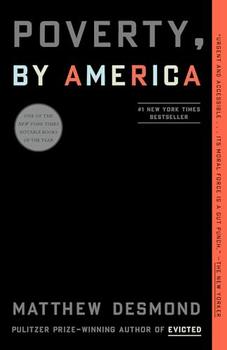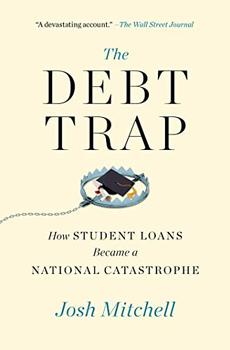Summary | Excerpt | Reading Guide | Reviews | Beyond the book | Read-Alikes | Genres & Themes | Author Bio

The Pulitzer Prize–winning, bestselling author of Evicted reimagines the debate on poverty, making a new and bracing argument about why it persists in America: because the rest of us benefit from it.
The United States, the richest country on earth, has more poverty than any other advanced democracy. Why? Why does this land of plenty allow one in every eight of its children to go without basic necessities, permit scores of its citizens to live and die on the streets, and authorize its corporations to pay poverty wages?
In this landmark book, acclaimed sociologist Matthew Desmond draws on history, research, and original reporting to show how affluent Americans knowingly and unknowingly keep poor people poor. Those of us who are financially secure exploit the poor, driving down their wages while forcing them to overpay for housing and access to cash and credit. We prioritize the subsidization of our wealth over the alleviation of poverty, designing a welfare state that gives the most to those who need the least. And we stockpile opportunity in exclusive communities, creating zones of concentrated riches alongside those of concentrated despair. Some lives are made small so that others may grow.
Elegantly written and fiercely argued, this compassionate book gives us new ways of thinking about a morally urgent problem. It also helps us imagine solutions. Desmond builds a startlingly original and ambitious case for ending poverty. He calls on us all to become poverty abolitionists, engaged in a politics of collective belonging to usher in a new age of shared prosperity and, at last, true freedom.
Poverty, by America leans upon history, since poverty is like an old oak tree with a million gnarly roots. I was surprised to learn that tipping waitstaff began after slavery, when former slaves who worked at restaurants were not paid and had to depend on the charity of diners. Desmond wants to do away with the sub-minimum wage for waiters. In another section of the book, he compares the aftermath of the 2008 recession with the financial effects of the COVID pandemic. After the 2008 recession, families in the bottom half of income levels had to wait a decade for their incomes to return to pre-recession levels. But after what Desmond calls "the COVID-induced recession," the same families had to wait just a year because of government intervention by way of stimulus payments and rental assistance. Desmond's scholarship and his unpacking of the multi-layered systems that keep poverty intractable, like housing, employment, banking, and government, is brilliant...continued
Full Review
 (919 words)
(919 words)
(Reviewed by Valerie Morales).
 When adolescents are baptized at the church where I worship, the recognized ritual is for the pastor to bellow out for all the congregation to hear and for the teenager to repeat: College. Job. Marriage. Family. In that order.
When adolescents are baptized at the church where I worship, the recognized ritual is for the pastor to bellow out for all the congregation to hear and for the teenager to repeat: College. Job. Marriage. Family. In that order.
The words conflate virtue with escaping poverty and are known as the success sequence. In principle, the success sequence is anchored in math. A full-time job will ensure a family can be sustained before children are born. That keeps the government at a distance. However, Princeton sociologist Matthew Desmond points to the flaws in the formula. For one, it blames the poor for their own poverty and what they cannot control: changes in economic trends.
In his book Poverty, by America, Desmond illustrates that ...

If you liked Poverty, by America, try these:

by Josh Mitchell
Published 2022
From acclaimed Wall Street Journal reporter Josh Mitchell, the dramatic, untold story of student debt in America.

by Marty Makary
Published 2021
One in five Americans now has medical debt in collections and rising health care costs today threaten every small business in America. Dr. Makary, one of the nation's leading health care experts, travels across America and details why health care has become a bubble.